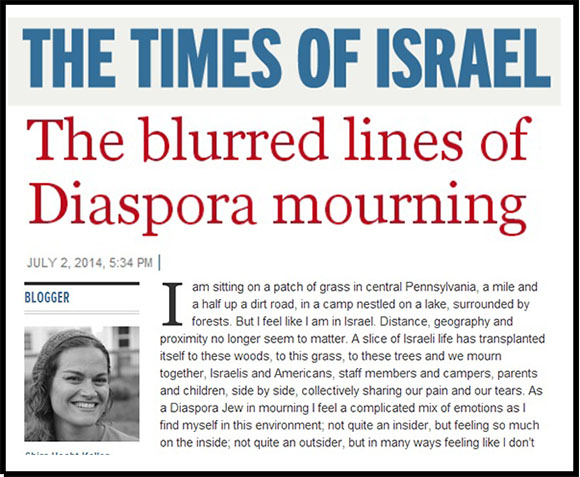In the wake of the tit-for-tat murders in Israel the past few weeks, two new instances of how Jewish Supremacists around the globe in fact only have one loyalty—to each other and Israel—have emerged in media sources directed specifically for Jewish consumption.
Both instances are articles in the Israeli-based Times of Israel. The first is a report, written by Jewish teacher from New York. It describes in detail how Jewish Supremacist “holiday camps in Pennsylvania,” and the second concerns a report on increasing Jewish emigration from France to Israel.
Both are valuable in that the provide insight into how Jewish Supremacists view their own position with regard to the Goyish countries in which they live, and the article about French Jews clearly demonstrates Israel’s racially-based immigration policies.
The first article, titled “The blurred lines of Diaspora mourning” appeared in the Times of Israel on July 2, 2014. Written by a teacher of the Talmud from SAR High School in Riverdale, NY, identified as Shira Hecht-Koller, the article clearly demonstrates that the Jews who attend these “summer retreats” openly declare their loyalty to Israel.

Some quotes from the article demonstrate this point:
I am sitting on a patch of grass in central Pennsylvania, a mile and a half up a dirt road, in a camp nestled on a lake, surrounded by forests.
But I feel like I am in Israel.
Distance, geography and proximity no longer seem to matter. A slice of Israeli life has transplanted itself to these woods, to this grass, to these trees and we mourn together, Israelis and Americans, staff members and campers, parents and children, side by side, collectively sharing our pain and our tears.
As we do every summer, we are gathered for two months of living, learning and teaching together. We share art projects and tennis matches. We learn classic Jewish texts and through hikes, games, overnights in the woods we teach our kids about the history of Israel and its contemporary culture.
Announcements are in Hebrew, and our days are structured according to central themes related to Zionist thought and Israeli culture. Despite our vastly different personal narratives and the diversity of our normal daily routines, for these moments, as we create our own mini-Israel in Pennsylvania, everything is shared.
An Israeli couple, currently on shlichut as emissaries in New York played the violin and flute, while their American students linked arms and sang along. The environment was somewhat surreal. It felt more like I was sitting on a yishuv in the Golan than on a grassy hill in Pennsylvania.
That sense has permeated our daily routine. The kids feel it. They know it. For a moment they can understand what it must be like to live a very different reality.
It informs their values and alters their behavior.
Today, as I was processing the events with a group of fourteen year old girls, with whom I learn every day, one girl commented on the bracelet that she wore on her right arm that was distributed to everyone on the first day of camp.
“I know I should probably take it off,” she remarked, “since it says v’shavu banim l’gvulam [‘the children shall return to their own borders’] and we can no longer bring them back. I feel guilty leaving it on, but I don’t want to take it off because it reminds me of who we are, how we care for one another and what we are capable of accomplishing.”

This open admission that there is actually a Jewish state within America, to whom these Jewish Supremacists actually owe their allegiance, is identical to the confession a few years ago by Stephen Steinlight, a Jewish Supremacist who served for five years as the Director of National Affairs for the largest and most powerful Jewish organization in the United States, the American Jewish Committee.
The second article in the Times of Israel deals with the increasing numbers of French Jews who are leaving that country to immigrate to Israel. Titled “Hundreds of French Jews bid adieu at pre-aliyah party”, the article repeats the claim that “rising anti-Semitism” is the cause of the increase in Jewish emigration—without mentioning that the rise in anti-Jewish attacks in France is directly linked to the mass immigration policies which these same Jews supported and agitated to be implemented in France.

The article reveals much about the Jewish single-loyalty question as well. Some quotes:
Jewish Agency chairman Natan Sharansky and his wife, Avital, were among those on hand at the ceremony along with Israeli Immigration Minister Sofa Landver and Haim Korsia, France’s newly elected chief rabbi.
During her address, Landver announced new regulations passed last month that she promised would ensure that most French professional diplomas — especially in paramedical fields such as optometry and physiotherapy — are automatically recognized in Israel, making it unnecessary for the new arrivals to retake exams.
“If you were good at your job here, you will be excellent in Israel,” she said. “We want you back home, our home.”
The article also contained a picture of some of the new immigrants to Israel showing off their Israeli identity cards—an indication that they have already been granted citizenship of Israel before they even set foot in that country.

In other nations, citizenship is usually only granted after a lengthy period of residence—but in Israel, they are quite happy to dish out citizenship based purely on biological descent—on racial descent only, no matter where the chosen individuals might live.
If ever there was a clear indication of both the racial basis of Israel and the ability of all Jews, from anywhere, to instantly “switch”, this is it.
Often Jews are accused of dual loyalty. This is an unfair allegation. As Israeli Minister Sofa Landver told the latest group of French Jews about to settle in Israel: “We want you back home, our home.”
In other words, there is no “dual loyalty.” There is only a single loyalty.





